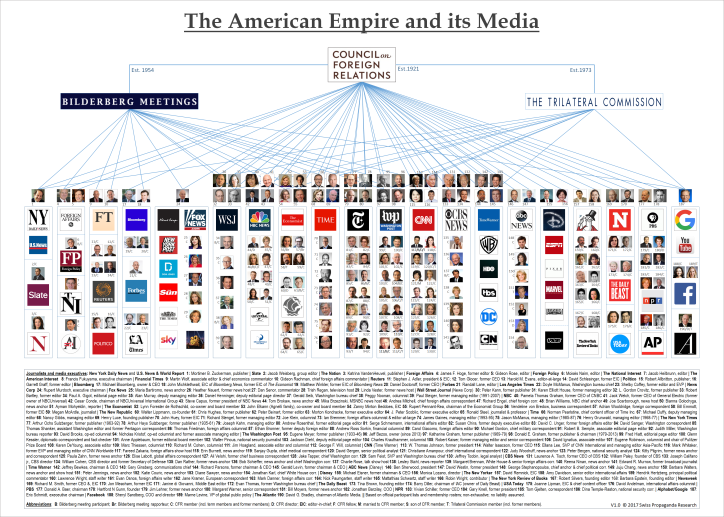This information can definitely scare some people, but I do believe that it is important that we do reconsider things nowadays, with all that is going on in our world. For example the medias, what is your connection with main-stream medias? My parents could never understand why I wasn’t interested in reading newspapers, watching the news, and I’m sure many of you are in the same place. I just never really coped with what I read. How could our world be so nasty? I’ve always been interested in beautiful stories, in solutions, and I so greatly believe in us, the human beings, the importance of vibrating high. It is not long ago, through a more personal affair, that I started to investigate, and I fell on many almost unbelievable stories we’d never read in the newspapers. And when this in my eyes very valuable article came to me, it corresponded so much with what I believe, that I greatly wanted to share it with you. Please just take it as an invitation to make your own opinion. Thank you. Coco***
Pressrevue:
Largely unbeknownst to the general public, many top journalists and executives of almost all major US news outlets have long been members of the influential Council on Foreign Relations (CFR).
Established in 1921 as a private, bipartisan organization to “awaken America to its worldwide responsibilities”, the CFR and its close to 5000 elite members have for decades shaped U.S. foreign policy and public discourse about it. As one Council member famously explained, the goal has indeed been to establish a global Empire, albeit a “benevolent” one.
Based on official membership rosters, the following illustration for the first time depicts the extensive media network of the CFR and its two main international affiliate organizations: the Bilderberg Group(covering mainly the U.S. and Europe) and the Trilateral Commission (covering North America, Europe and East Asia), both established by Council leaders to foster elite cooperation at the international level.
In a column entitled “Ruling Class Journalists”, former Washington Post senior editor and ombudsman Richard Harwood once described the Council and its members approvingly as “the nearest thing we have to a ruling establishment in the United States”.
Harwood continued: “The membership of these journalists in the Council, however they may think of themselves, is an acknowledgment of their active and important role in public affairs and of their ascension into the American ruling class. They do not merely analyze and interpret foreign policy for the United States; they help make it. () They are part of that establishment whether they like it or not, sharing most of its values and world views.”
However, media personalities constitute only about five percent of the overall CFR network. As the following illustration shows, key members of the private Council on Foreign Relations have included:
- several U.S. Presidents and Vice Presidents of both parties;
- almost all Secretaries of State, Defense, and the Treasury;
- many high-ranking commanders of the U.S. military and NATO;
- almost all National Security Advisors, CIA Directors, Ambassadors to the U.N., Chairs of the Federal Reserve, Presidents of the World Bank, and Directors of the National Economic Council;
- some of the most influential Members of Congress (notably in foreign & security policy matters);
- many top jounalists, media executives, and entertainment industry directors;
- many prominent academics, especially in key fields such as Economics, International Relations, Political Science, History, and Journalism;
- many top executives of Wall Street, policy think tanks, universities, and NGOs;
- as well as the key members of both the 9/11 Commission and the Warren Commission (JFK)
Eminent economist and Kennedy supporter, John K. Galbraith, confirmed the Council’s influence: “Those of us who had worked for the Kennedy election were tolerated in the government for that reason and had a say, but foreign policy was still with the Council on Foreign Relations people.”
And no less than John J. McCloy, the longtime chairman of the Council and advisor to nine U.S. presidents, told the New York Times about his time in Washington: “Whenever we needed a man we thumbed through the roll of the Council members and put through a call to New York.”
German news magazine Der Spiegel once described the CFR as the “most influential private institution of the United States and the Western world“ and a “politburo of capitalism”. Both the Roman-inspired logo of the Council (top right in the illustration above) as well as its slogan (ubique – omnipresent) appear to emphasize that ambition.
In his famous article about “The American Establishment”, political columnist Richard H. Rovere noted: “The directors of the CFR make up a sort of Presidium for that part of the Establishment that guides our destiny as a nation. () [I]t rarely fails to get one of its members, or at least one of its allies, into the White House. In fact, it generally is able to see to it that both nominees are men acceptable to it.”
Until recently, this assessment had indeed been justified. Thus, in 1993 former CFR director George H.W. Bush was followed by CFR member Bill Clinton, who in turn was followed by CFR “family member” George W. Bush. In 2008, CFR member John McCain lost against CFR candidate of choice, Barack Obama, who received the names of his entire Cabinet already one month prior to his election by CFR Senior Fellow (and Citigroup banker) Michael Froman. Froman later negotiated the TTP and TTIP free trade agreements, before returning to the CFR as a Distinguished Fellow.
It was not until the 2016 election that the Council couldn’t, apparently, prevail. At any rate, not yet.
Published in July 2017
References
- Council on Foreign Relations:
- Board of Directors
- Membership rosters, 1922 to 2013 and 2016
- CFR members in U.S. Administrations, 1900 to 2014
- Bilderberg conference: participant lists 1954 to 2014 and 2015-2017
- Trilateral Commission: membership lists of 1973; 1978; 1985; 1995; 2010; and 2017
- Laurence H. Shoup (2015): Wall Street’s Think Tank: The Council on Foreign Relations and the Empire of Neoliberal Geopolitics, 1976-2014, Monthly Review Press
- Wikipedia pages about the CFR, the Bilderberg Group, and the Trilateral Commission
About the authors
Swiss Propaganda Research is an independent research group investigating geopolitical propaganda in Swiss and international media. You can contact us here.






